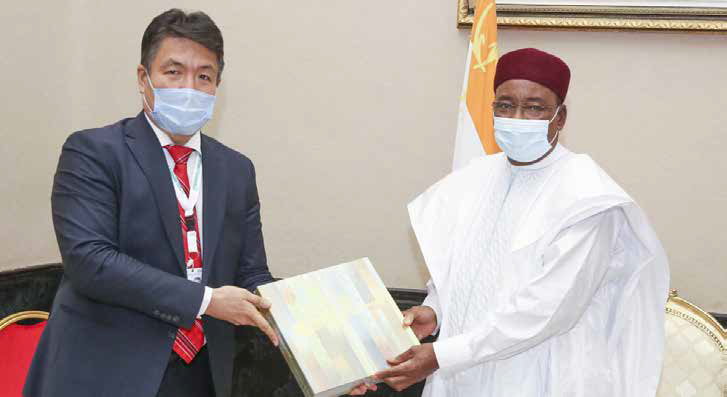YERLAN ALIMZHANULY BAIDAULET
DIRECTOR GENERAL ISLAMIC ORGANIZATION FOR FOOD SECURITY (OIC SPECIALIZED INSTITUTION)
Your Excellency, you have been instrumental in bringing a lot of change in Kazakhstan and the wider CIS region. First and foremost, you have ably and forcefully advocated Islamic finance, for which you were awarded the GIFA Special Award (Leadership Role) in 2015.
Would you care to tell us what makes you so passionate about Islamic banking and finance?
Thank you for recognising my continuous efforts to bring about changes to our local real economies. I came into Islamic banking accidentally. When I started back in the 1990s, not many people were aware of it. We had recently survived the political crisis, and people like me with the Leninist and communist mind-set had a hard time coming to terms with capitalism. However, my selection as the first Islamic Development Bank (IsDB) country representative allowed me to make a difference. Working for an ‘Islamic bank’ was an unprecedented challenge because everybody, mostly in the government circles (IsDB is a G2G institution), was asking: “Why an Islamic bank? What is the difference between an Islamic and conventional bank?”
Let me quote an anecdote. Once during the ratification of a concessional loan (qard al hasan) agreement for a rural water supply project, an elderly senator, who was also a famous economist-academician, asked me: “Why is your Islamic bank charging interest (it was just a ceiling rate not exceeding 1.2% of service margin)? You guys are big liars, as I have heard at one big economic conference that you are a non-interest institution.” I requested him to give me three days to answer. On investigation, I found several definitional discrepancies due to inadequate translation of essential concepts into Russian, such as the ceiling rate was translated as ‘compound interest rate’. I also requested my IsDB colleagues to calculate 30 years of ceiling margins on the expected fixed and variable cost of such a loan and give a possible figure if an interest-rate method was used. Alhamdulillah, by the next meeting in the parliament, I had a table with the actual ‘interest rate’ of the loan in question, which was 0.02%. The senator was visibly shocked and exclaimed: “Stunningly, it is even cheaper than our famous benchmark of JBIC (0.5%). Now I understand why Islamic banks charge zero interest rate”.
In 2002-03 I processed the first-ever IsDB-funded private sector project in Kazakhstan. It was an ijara purchase of agricultural machinery for a Russian orthodox farmer.
Interestingly, he had applied several times for the loan. First for the seeding campaign in March, then to purchase previous year’s grains from other producers, and later for wheat harvesting. On every occasion, due to the long processing cycle of IsDB (particularly by its private arm, Islamic Bank Portfolio (IBP)), his requests were declined. Whenever he became anxious because of the delays, I would ask him to exercise sabr (patience). I told him that at the end of the day, he would be rewarded by God for showing patience.
His fourth loan request for the purchase of agricultural machineries (harvesters, tractors, trucks and accessories) was eventually accepted. I was nervous till the last minute of that contract to be paid as of December 31, 2002.
The Russian farmer came to meet me after two weeks of the out payment. He had a broad smile on his face when he entered my office and told me how my advice to exercise sabr had resulted in a reward. The ex-works prices on all agricultural machinery he had bought at a much lower price were increased by the producers by 30 to 50 percent, which were partially resold by him at a higher profit, whereas the wheat price in January 2003 had risen to above 100 percent of the original cost. So he was able to repay this lease finance just in one year.
He later successfully applied to IsDB for two more other Shari’a compliant funding. He has since progressed to become one of the largest grain farmers in the country.
This case obviously shows that Islamic finance is not only for Muslims, but has blessed all those who work and produce permitted goods or services. How can I not be passionate about Islamic banking after witnessing its good luck in my personal and professional life? I have seen so many blessings showered on those who had opened their heart and soul to truth and Iman.
In October 2010, I gave up my highly-paid job for a low-paid civil servant’s position and, with Allah’s blessing, had the opportunity to build and benefit the Islamic finance system of my country in a combined role as the Adviser to the deputy Prime-Minister on OIC-related matters, as the Head of the Inter-ministerial Task Force on drafting the Islamic Finance Development Road Map 2020, as the Chairman of the Association for Development of Islamic Finance and as a motivational force behind the private sector for arranging the Kazakhstan Islamic Finance Conference in 2009-2013 – a unique sectoral event in CIS.
Moreover, the government also nominated me as a first Executive Director to the IsDB Board to represent seven CIS and Eastern Europe countries. During the board meetings, my colleagues called me an Islamic finance champion because of my frequent initiatives and support to the projects focused on the global Islamic finance industry. My 20-years journey with IsDB is a joy that I would continue to relish, in sha Allah.
Becoming the founding Director-General of the Islamic Organization for Food Security (IOFS) must be challenging. You have brought remarkable success to the organisation in a very short span of time, even during the COVID-19 crisis. How has the journey been so far?
The actual establishment of the Food Security Office for Islamic countries originated from the IsDB Board’s deliberations in March-April 2011 on the successful outcomes of the Jeddah Food Security Declaration for Africa. The President of Kazakhstan, H.E. Nursultan Nazarbayev, first floated this idea on June 8, 2011, at the 7th World Islamic Economic Forum in Astana. He also mentioned the importance of its creation during the 38th session of the OIC Council of Foreign Ministers meeting in Astana.
As a board member, I had to struggle to get an approval for the IsDB Technical Assistance Grant for the capacity building of this much sought-after OIC specialised body. Thank God, after a long delay, the grant was given. Currently the IOFS team and selected consultants are working to soon complete this critical project.
Despite every difficulty and occasions that happened since the 1st General Assembly (from April 2016 till May 2019), I was called to take over the IOFS leadership and start from scratch. Since then, working gradually I have built the institution and my team with the close cooperation of the ministries of Agriculture and Foreign Affairs of the host country. I practise the 24/7-time regime to work on the project (the same methodology I used during my first contract with IsDB some twenty years ago).
During the global pandemic, which has entirely transformed the human society, we tried to cooperate with our member countries and the sister institutions of OIC, including the IsDB Group.
I am firmly committed to what I do and am pleased to serve the Ummah with the IOFS mission focused on food security and agricultural development. The project has once again convinced me that Allah SWT always opens doors and opportunities, even if you do not know where to go at the start of the journey.
As of now, there are 34 members of the IOFS. Do you plan to include all the 57 member countries of OIC? Would you consider opening the membership to non-OIC countries as well?
Since May 2019, the IOFS Secretariat has held multiple visits and meetings with the ministers of agriculture, and the ambassadors and other officials of the OIC Member States. However, during this unprecedented and challenging period of the COVID-19 pandemic, we have been holding online meetings with our Member States. It has not been an easy task. We also had to work around the issue of language.
Among them are two Portuguese-speaking countries, Mozambique and Guinea-Bissau. To facilitate them, we have decided to hire linguistic professionals having OIC-related experiences. To raise awareness about our programs, we have been conducting country-specific online/physical meetings and practical workshops.
Nowadays, we are hopeful to see all 57 OIC Member States’ participation in the 4th General Assembly of IOFS in Nursultan, Kazakhstan, in September this year in sha Allah.
To build a strong bilateral partnership, the IOFS Secretariat has stressed implementing all its 16 programmes in accordance with every country’s specific socio-economic interests.
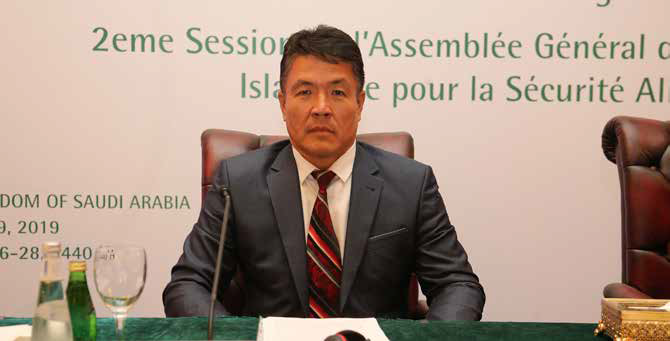
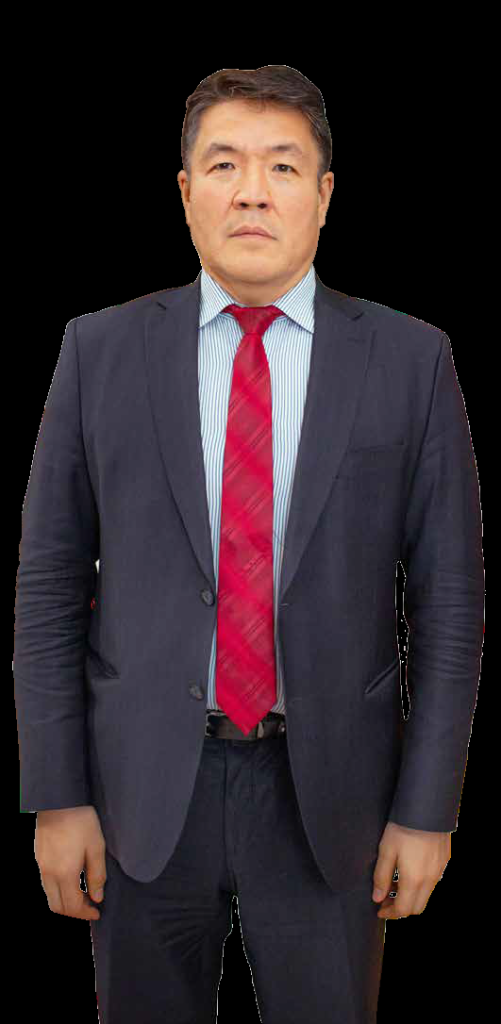
WE ARE HOPEFUL TO SEE ALL 57 OIC MEMBER STATES’ PARTICIPATION IN THE 4TH GENERAL ASSEMBLY OF IOFS IN NURSULTAN, KAZAKHSTAN, IN SEPTEMBER THIS YEAR
The IOFS strictly follows the OIC rules for a close commitment with its Member States. Upon G2G status, our institution coordinates closely with the foreign ministries for new memberships. For example, during the recent 3rd General Assembly in Ankara, Turkey, the announcement was made by Tunisia for starting the internal process for signing the IOFS Statute. We expect more OIC countries to join us before and at the forthcoming annual meeting.
As for the non-OIC countries, the OIC observer states may commence their process for OIC membership, only then could IOFS and other institutions of OIC could take similar organisational steps. It will take the political will of these countries to have the OIC door open for them. However, it is paramount for all the international organisations (FAO, IFAD, WFP, CGIAR, ICARDA and ICBA) to cooperate with IOFS and other OIC organisations for sustainable food security.
Smart agriculture is one of the pillars of the food security strategic plan of the OIC. How well poised is the IOFS to further this agenda?
Smart, digital and innovative technology would allow us to mitigate the challenges we are currently facing in the agriculture sector. The agriculture sector uses 75% of our freshwater, which may not be available in future. At the same time, there are water deficit areas facing desertification. The shortage of arable land has also contributed to food shortages, which can be overcome by adopting vertical and hydroponic farming (like in the UAE). We need technological interventionists like plant breeders, high-tech engineers and remote sensing specialists to grow drought-tolerant plants and develop efficient water management strategies. Safe, clean and affordable energy in the agriculture sector could play an important role in stemming CO2 emission, mitigating climate change. Some exciting research is taking place in this regard in KAUST, ICBA and ICARDA, among others.
Food security is a serious issue everywhere in the world, including in the OIC block. Is IOFS all about food security, or is there more to it?
The Islamic Organization for Food Security framework consists of 16 programmes structured under five categories to deals with an entire range of food security issues.
The first pillar is based on the OIC Plan of Action for Strategic Commodities. It deals with wheat, rice, cassava and palm oil. Several member countries also want to add date palms, potato or maize. The regional IOFS Centres of Excellence for Research can help farmers in member countries to enhance the quality and productivity of these basic crops and be self-sufficient.
The second pillar would be developed towards the OIC food security reserve system. This programme would allow countries to build food insurance schemes on a regional level to prevent food emergencies because of natural disasters and other related shocks. Such a food security reserve would also ensure fixed rate for selected crops.
The third category is linked to the OIC Science and Technology Agenda 2026. It focuses on transboundary pest control management (focusing on locust), water management, developing national genebanks, food safety and halal food.
The fourth category emphasises the role of the private sector in agro-based trade and investment. In this regard, the IOFS managers lead four programmes: International Islamic Food Processing Association, Food Security Governance, National Food Clusters Development and IOFS Food Balance Database.
The fifth category deals with humanitarian food programmes that focus on two main projects, Flour for Humanity and Qurbani Meat. These programmes also assist Member States to improve their grain processing and livestock industry.
Unfortunately, the initial team (since 2016) was not able to conceptualise a comprehensive coverage of food security. Some officials took IOFS as a platform to only arrange wheat exports. But today, we have learned to use it to achieve sustainable food security in the OIC countries. However, to keep the IOFS, which is still in its infancy, moving is not easy. It needs financial and structural support from founding Member States.
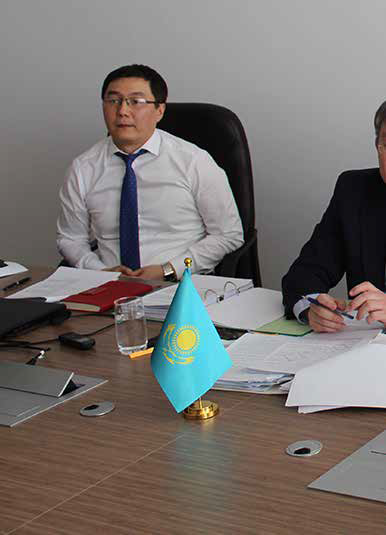
SMART AND INNOVATIVE TECHNOLOGY WOULD ALLOW US TO MITIGATE THE CHALLENGES WE ARE CURRENTLY FACING IN THE AGRICULTURE SECTOR
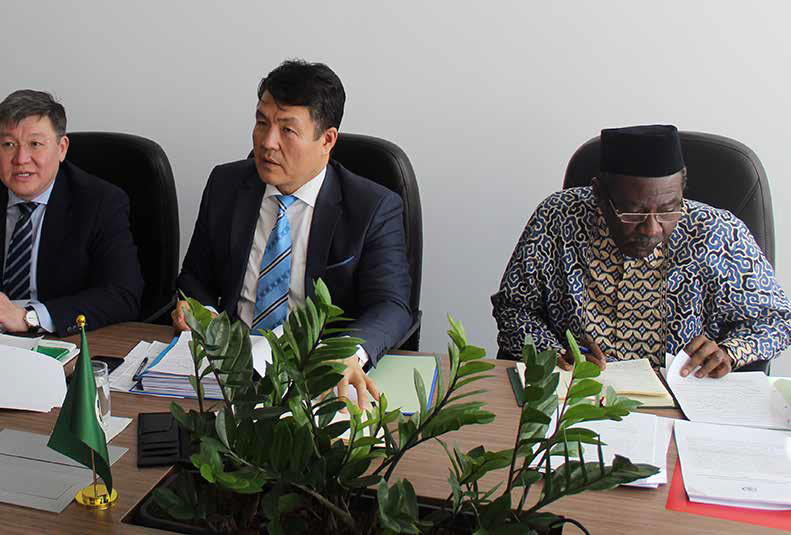
Food security will become an even bigger issue in the post-COVID era. Do you have any specific plan to meet the challenges of the ‘new normal’?
We worked closely, throughout 2020, with member countries and other OIC institutes to combat the negative impact of COVID-19 on the agriculture sector. IOFS Secretariat underscores the need for a close intra-OIC partnership as a critical factor for resolving post-pandemic consequences. In this regard, the launch of the food security governance program would enhance the institutional capacity in the field of national food security. UAE, Indonesia and Bangladesh, among others, are running excellent Food Security Governance programmes, which could be best samples for the IsDB-funded Reverse Linkage mechanism to elaborate exchange of knowledge and skills within the South-South agenda. We can also transfer best international practices from Europe or the US to our member countries to build a more resilient food system within the OIC region.
Furthermore, IOFS gives special attention to modalities related to synergising food safety and halal food. The IOFS programs for the development of food safety and halal food come under “From Gene to Fork” and “Safe and Halal Food”. The halal food chain does not concern only a specific part of the food access chain (like for meat). It starts from the gene/ seed level and the importance of their safety and benefit to human health, to reach the reduction of food waste. The programmes aim to work closely with food manufacturers to prevent or reduce food risks and provide expertise on food chain production, organisation and storage of food using non-genetically modified methods, in addition to adopting high food safety and quality standards, promoting halal food standards, and developing halal product exports.
Along with the above initiatives, IOFS would enhance agri- food trade among OIC member countries by building intra- OIC food supply chains via its newly established subsidiary, the International Islamic Food Processing Association (IFPA). It is common knowledge that the share of food waste of OIC countries is above 30% and that more than 80% of all halal food supplies are from the non-OIC states. These factors impede the OIC food security development efforts. So the IFPA will target decreasing food wastage rate by introducing AgriTech and FinTech in the agriculture sector and establishing the intra-OIC halal food market in collaboration with the Member States’ local food industries and their global competitiveness, in sha Allah.
You have been actively engaged with several member countries, particularly Pakistan, an essential grain-producing country. What mutual benefits do you foresee out of such engagements?
Given Pakistan’s strategic importance within the OIC, the IOFS considers it one of the important Member States. We look forward to engaging with Pakistan’s private sector, the development of which is also vital for country’s national economy.
I recently had a fruitful meeting with both the Federal Minister of Pakistan for National Food Security & Research, H.E. Syed Fakhar Imam and the new Ambassador of Pakistan to Kazakhstan, H.E. Sajjad Seehar. My Pakistani-origin colleague Sheikh Bilal Khan, DG-CEO of International IFPA (IFO subsidiary that engages the private sector) accompanied me. In the coming months we plan to pay a high-level visit to Pakistan to discuss strategic objectives related to food security, water resources and intra-OIC trade in the public and private sectors.
IFPA WILL TARGET DECREASING FOOD WASTAGE RATE BY INTRODUCING AGRITECH AND FINTECH IN THE AGRICULTURE SECTOR AND ESTABLISHING THE INTRA-OIC HALAL FOOD MARKET
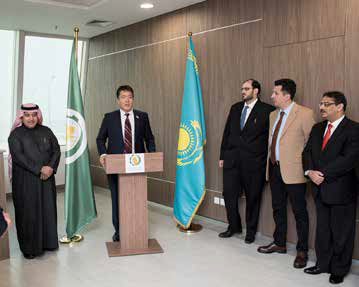
IFPA is considering establishing a local presence to benefit from the CPEC project, which will help link CIS markets to the Middle East, Africa and the broader Asia.
The Federal Minister had shown immense interest in the IFPA projects for an innovative technology platform for agri-food intra-OIC trade. We also plan to use the potentials of each province of Pakistan to deal with the entire agri-food ecosystem—from Gene to Fork.
For this purpose, IOFS/IFPA will work closely with the national investment agencies of IOFS Member States to enhance FDI, intra-OIC trade, and agri-business contribution to GDP, and to reduce import dependency and lack of competitiveness with the non-OIC markets. To fulfil these ambitious objectives, we have developed a good rapport with the ICCIA, headquartered in Karachi.
IOFS and Pakistan can also share their respective experiences and knowledge in matters related to climate change, COVID-19 response, the problem of locust, post-harvest losses, gene-oriented plant varieties and any STI agendas. The OIC COMSTECH in Islamabad could be the ideal place to delve upon these issues or for experimentation on these projects.
What role can Islamic finance play in developing an infrastructure for food security for the OIC Member States?
In the OIC member countries where the domestic Islamic finance industry plays a key role, like GCC, Bangladesh or South East Asia, it is more than obvious to note an increasing share of investment in the food-related sectors such as basic farming, food processing, food trading and logistics etc. As of my knowledge, ISFIRE has also published sectoral reviews in this regard.
Islamic Development Bank, which has been active in developing the intra-OIC value chain, underscores upon the Joint Action Plan its partnership with the IOFS on flagship programs focused on giving technical assistance to and funding capital-intensive projects in Centers of Excellence for strategic food commodities, OIC food security reserves, Grain Fund and the entire IOFS modality “From Gene to Fork”.
IOFS AND PAKISTAN CAN ALSO SHARE THEIR RESPECTIVE EXPERIENCES AND KNOWLEDGE IN MATTERS RELATED TO CLIMATE CHANGE, COVID-19 RESPONSE, THE PROBLEM OF LOCUST, POST-HARVEST LOSSES, GENE-ORIENTED PLANTVARIETIES
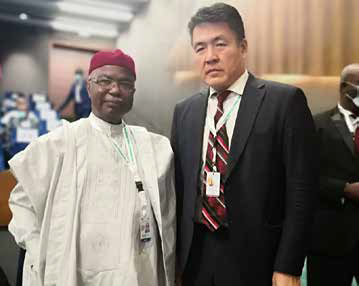
THE WORLD ECONOMIC CRISIS OF 2009-2010 TURNED THE ATTENTION OF THOUSANDS IN THE EMERGING COUNTRIES, ESPECIALLY IN THE CIS REGION, TO ISLAMIC BANKING AND FINANCE
Do you envisage a combined role of Islamic finance and the halal industry in meeting challenges of food security in the member states of the OIC?
Yes, I do. As both sectors are organic parts of the entire Islamic economic ecosystem, I am confident that only such a combination would naturally strengthen the sustainability of food security within the OIC region as well as globally.
Ideally, each currency unit of the Islamic financial sector should infer the value of each currency unit of the real assets of the halal industry, where agriculture and food processing are the fundamental ones.
It will not be an exaggeration to call you the Father of Islamic Economics in the CIS Region. Do you think that the CIS region can play a leadership role in Islam’s intellectual renaissance once again?
I would not consider myself accepting of such a historical title. However, we have to acknowledge the contributions of the Tatar economists of the Russian tsar’s period as predecessors of this conceptualisation within the CIS region. Till the end of the 1990s, nobody among the post-Soviet academicians and practitioners was concerned with the linkage between moral-spiritual values and the real economy. I have narrated above how a leading economist was extremely sceptical about our industry. When I first introduced this topic to my economist colleagues, even they wondered why I was giving importance to it. They considered it a misconception. Another problem was that almost all of the students and professors in the Soviet universities had grown up studying economic literature in Russian only. A handful of economists or financiers knew English, and nobody was familiar with Arabic that would have helped them analyse materials on Islamic finance or economics.
The first intervention in this closed intellectual atmosphere was made in Millennium’s first decade with the opening up of the Internet. I, too, entered this profession without any in-depth knowledge, even of basic Shari’a principles. Later on, however, the younger generation educated in Islamic banking and finance from Malaysia, GCC, and even the UK joined the profession.
The world economic crisis of 2009-2010 turned the attention of thousands in the emerging countries, especially in the CIS region, to Islamic banking and finance.
Of course, in the last ten years, my advocacy efforts (interviews in local and overseas mass media, books, public events, consultancy, related civil service and law drafting) were critically instrumental in building public awareness on different concepts related to Islamic banking and finance in countries such as Kazakhstan, Russia, Kyrgyzstan and Uzbekistan.
Everyone is aware of the contribution of Central Asia’s scientists to the Islamic civilisation. I believe that leadership driven by Islamic values would once again emerge from among our young economists and financiers from the countries mentioned above, especially in Uzbekistan. Signs to that end have already started showing up. And I am confident that this trend will benefit everyone at the regional and national levels.
WE ARE WORKING CLOSELY WITH THE ISDB GROUP TO DEVELOP THE GRAIN FUND; A PROGRAMME TO INCREASE MUTUAL AGRI – TRADE AND INVESTMENTS AMONG OIC MEMBER COUNTRIES
What would be your reaction to setting up a global Islamic fund for agricultural commodities, with a view to ensure food security for the OIC block but also to create an additional source of revenue for the operations of IOFS?
My reaction is subject to my long theoretical and practical experience in Islamic finance. I am optimistic about the success of such an arrangement. We are working closely with the IsDB Group to develop the Grain Fund; a programme to increase agri-trade and investments among OIC member countries. This future financial arm of the IOFS would ensure food security and funding, utilising waqf takaful, for its operational activities.
Any message that you would like to give to the readers?
I want the Islamic economic system to grow organically within the world real economy due to its viability and inclusivity. In my view, there should be an end to the overarching presence of the usury-based system. The new generation of taqwa intellectuals in Islamic finance should look forward to conceptualising and embracing such tectonic transformations. In this regard, they would have to learn and adopt digitalisation and innovations in High- and FinTech.
Briefly, we should all aim for not only healthy and sustainable economic development but also smart and rational thinking.
I WANT THE ISLAMIC ECONOMIC SYSTEM TO GROW ORGANICALLY WITHIN THE REAL-WORLD ECONOMY DUE TO ITS VIABILITY AND INCLUSIVITY AND AN END TO THE OVERARCHING PRESENCE OF THE USURY-BASED SYSTEM
